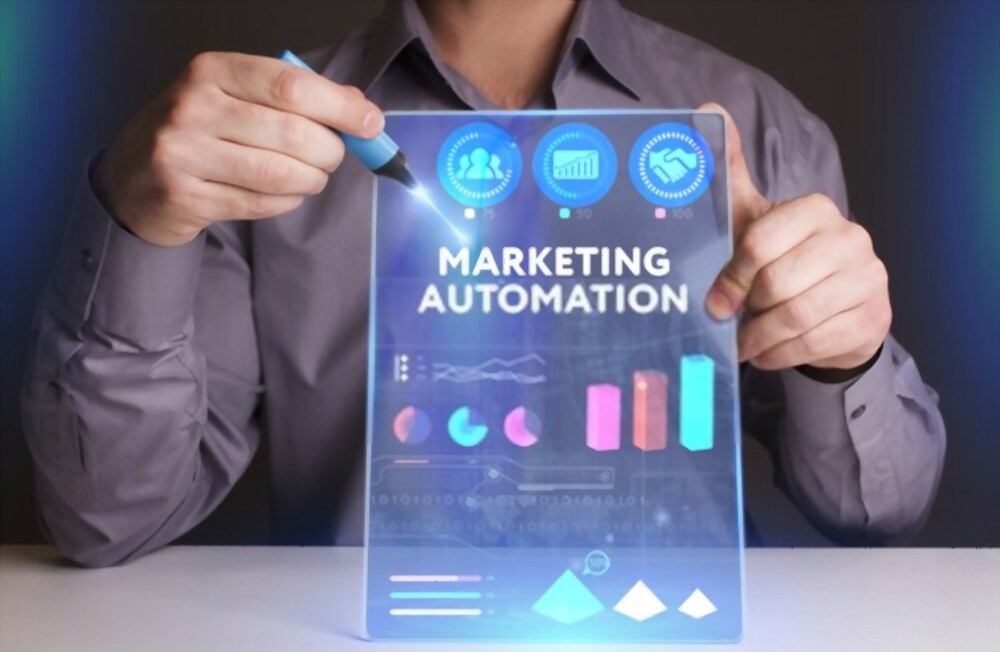Marketing automation is a mainstream of the digital transformation of all businesses. It increases operational efficiency and accelerates sales. This trend is the precursor of a digital revolution within the reach of SMEs.
According to Grand View Research, marketing automation will be worth $ 7.63 billion by 2025. Because this coronavirus pandemic is forcing us to work remotely, there’s no better time to embrace a solution. automation for your own marketing practices.
This blog explains marketing automation and its main benefits for a business.
What is Marketing Automation?
Marketing automation or marketing automation includes software platforms or tools that help companies automate their marketing processes to
- generate more leads
- convert them into sales
- increase return on investment.
There are several definitions of marketing automation depending on the size and activities of the business.
We can say that a combination of software and strategy is marketing automation. It is a great way to nurture your prospects with highly personalized content that will further help to convert your prospects into happy customers.
Marketing automation can be compared to growing your backyard. You need fertile soil, seeds, water, and light to grow lush, flourishing plants. With good marketing automation, you generate enough leads (the seeds) and reap paying customers (the lush plant).
One of the most effective components of marketing automation is email automation (sprinkling). It automatically sends specific and personalized emails to your brand’s subscriber list based on predefined triggers. For example, a welcome email is automatically sent to the Internet user in response to a subscription to your newsletter. Although automated, this emailing remains targeted.
Did you know that automated emails get an 86% higher open rate on average? They also get an approximately 196% higher click-through rate and generate up to 320% more revenue compared to the average promotional email. To learn more about email marketing automation and how it helps boost your business sales, click here!
Besides automated email marketing, marketing automation software automates various repetitive tasks in your business, such as:
- Feeding social media content,
- monitoring website interactions and
- The segmentation of your subscribers, leads, and customers
- As well as the management of various other tasks.
This helps your marketing team to streamline repetitive and tedious tasks to better focus on creating value. For example, marketers can focus on lead generation, segmentation, maturation, and scoring. They can also improve the customer lifecycle, including the customer retention stage. By identifying opportunities for upselling and cross-selling, the return on investment ( ROI ) of marketing grows.
Your customers interact with you and your products/services not only through your website but also through other multiple sources such as social media, mobile apps, and / or email. This gives you many sources of data to use to identify the needs and habits of your potential customers. These figures make it possible to assess the efforts required as well as the campaigns that are most successful.
By integrating with other sales and marketing tools (CMS, CRM, social media), Marketing Automation gives you a cohesive view of your audience. It allows you to create more refined segments, develop better-targeted messages, and guide your prospects step-by-step to the sale (optimization of the sales funnel).
No matter how many leads you have, marketing automation is capable of handling large volumes of information.
Some benefits of marketing automation for your business?
Improved efficiency and ROI
As your organization grows, it is not cost-effective to engage marketing managers and the sales team for (manual) tracking of leads and customers. Just as ineffective is forcing them to strike up a one-on-one conversation for each prospect and customer.
Having marketing automation in place, even at an early or middle stage, allows your marketing team to plan multiple tasks such as
- Sending mass emails,
- Identification and segmentation of prospects according to the conversion potential,
- Maintenance of the relationship with prospects according to defined workflows,
- Creating engagements – such as sending customer review surveys after a predefined interaction/time period.
Not only does this automation exponentially improve marketing efficiency by achieving maximum results with minimum manual work, but your marketing team also becomes more profitable. Because it mainly engages in more strategic and creative tasks, your return on investment (ROI) becomes more attractive.
Lead nurturing
The maturation of prospects or lead nurturing is a marketing process that aims to create, maintain and maintain a marketing relationship with prospects to move them from cold prospects (prospect who discovers your product range), to hot prospects (prospect who is very closely interested in a target product) and having the purpose of making them pass a sales action, thus becoming a customer. Lead nurturing is therefore aimed at prospects who are not yet in a phase of sufficient purchasing maturity to take action and aims, in particular via marketing automation, to help them in their thinking through the contribution of qualitative and explanatory content.
So, with your marketing automation tools, you “feed” the leads acquired with your demand generation strategy. Your automation processes analyze the performance of content consumed by your targets by monitoring metrics such as open rate, click rate, and conversion rate.
Once you have clearly identified the content that convinces and converts prospects into customers, you recycle these qualitative and explanatory elements in other parts of your marketing.
When you build your prospecting campaign with your automation tools, you review the steps taken by your prospects and customers. This big picture allows you to determine where your customers are along their journey. If people get stuck at some point, you spot exactly the bottlenecks in the customer journey. These areas should be addressed first to gain efficiency.
Here is an example from Dell, the famous computer manufacturing company. After noticing high volumes of traffic to their online store but very little sales, Dell took advantage of analyzing the behavior of their customers during their shopping journey. In order to increase sales, Dell created new ads based on different items like customer web history, products viewed, and products left in web shopping carts resulting in a 70% increase in click-through rate and 300% conversion rates.
Boost productivity
One of the most important goals of automation is to minimize or even eliminate human intervention in repetitive tasks. Thus, your employees mainly focus on creative tasks with high added value which cannot be automated because only human beings can do it.
By using the creativity of your human resources for tasks such as marketing strategy, calendar planning, digital customer experience mapping, campaign performance monitoring, you make your machines more efficient. This virtuous loop brings you unparalleled productivity gains.
Real-time performance measurement
The Adestra 2017 study found that 37% of marketers see performance measurement as an important goal of marketing automation.
Real-time campaign data analysis allows you to estimate the quality of your campaign. By tracking metrics like open rate, click-through rate, etc., you identify what worked (or ps) with your followers. This analysis gives you the keys to adjust and optimize your marketing campaigns along the way.
To conclude this topic on marketing automation, effective marketing sets you apart from your competition. What Marketing Tactics Work? The amount of time devoted to it? are the questions that business leaders ask themselves when implementing their digital marketing strategy. Fortunately, marketing automation tools make it easier for you and your team. By automating, you dedicate your resources and attention to machines that increase the success of your business.

